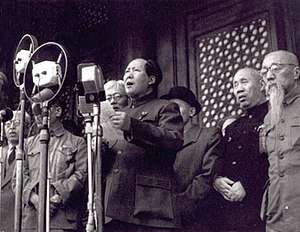Wartime perception of the Chinese Communists

The Wartime perception of the Chinese Communists was a matter of debate in the United States before and during World War II in both the public and the government. In the Soviet Union, Soviet leadership had complex attitudes toward the Chinese Communists.
Founded in 1921, the Communist Party was initially allied with the Kuomintang until the second half of the 1920s, when it was purged from membership within the unified national government under Chiang Kai-shek. In 1934, the party nearly annihilated, the remnants under the guidance of future Chairman Mao Zedong launched an ambitious retreat to escape destruction by the Kuomintang, known as The Long March. It was through the Long March that much of the Western world was first introduced to the communists in China via Red Star Over China, a narrative of the march and introductory biography for several Communist leaders, by the American journalist, Edgar Snow.
In what would be the dominant American perception of the CCP before the Communist victory, Snow reported that Mao was not a radical revolutionary, downplaying his calls for class struggle and highlighting his anti-imperialist rhetoric,[1] and many readers got the impression that the Chinese communists were "agrarian reformers."[2] He described Mao and the Communist as a progressive force who desired a democratic, free China. Writing for The Nation, Snow stated that the Chinese Communists "happen to have renounced, years ago now, any intention of establishing communism [in China] in the near future."[3]
In the 1944 Dixie Mission, US Colonel John Service visited the Communists and praised them, claimed that they were democratic reformers, likening them to European socialists rather than Soviet Communists and claimed that they were less corrupt and chaotic than the Nationalists, and that they would preserve levels of capitalism for an extended time until a peaceful transition to a fully realized communist society.[4][5]
US Ambassador to China Clarence Gauss recommended the United States "pull up the plug and let the whole Chinese Government go down the drain".[6] General Patrick Hurley claimed that the Chinese Communists were not real communists,[6] and insisted that the differences between the Communists and Nationalists were no greater than those between the Republican and Democratic parties in the United States.[7] China Burma India Theater Commander Joseph Stilwell repeatedly claimed (in contradiction to Comintern statistics) that Communists were doing more than the KMT against Japan, and sought to cut off all US aid to Chiang.[6][8] The US strove to send aid to the Chinese Communists during the war.[9]
Soviet foreign minister Vyacheslav Molotov told General Hurley that Mao and the rest of the Chinese Communists were not really Communists and that the Kremlin had no connections with them. The claims were accepted by Hurley at face value.[10]
Stalin privately underestimated the Chinese Communists and their ability to win a civil war, instead encouraging them to make peace with the KMT.[11] Stalin was worried that Mao would become an independent rival force in world communism, preferring a divided China with Mao subordinate to the KMT.[12]
See also
References
- ↑ Brady, Anne-Marie (2003). Making the Foreign Serve China: Managing Foreigners in the People's Republic. Lanham: Rowman & Littlefield Publishers. p. 46,47. ISBN 0742518612.
- ↑ Kenneth E. Shewmaker, "The "Agrarian Reformer" Myth," The China Quarterly 34 (1968): 66-81.
- ↑ Hamilton, John M., Edgar Snow: A Biography, LSU Press, (2003) ISBN 0-8071-2912-7, ISBN 978-0-8071-2912-8, p. 167; Shewmaker, Kenneth E., Americans and Chinese Communists, 1927-1945: A Persuading Encounter, Ithaca, NY: Cornell University Press (1971) ISBN 0-8014-0617-X
- ↑ John Service, Report No. 5, 8 March 1944, to Commanding General Fwd. Ech., USAF – CBI, APO 879. "The Communist Policy Towards the Kuomintang." State Department, NARA, RG 59.
- ↑ U.S. Congress. Senate Committee on the Judiciary, Subcommittee to Investigate the Administration of the Internal Security Act and the Other Internal Security Laws. The Amerasia Papers: A Clue to the Catastrophe of China. Vol. 1 (Washington, D.C.: GPO, 1970), 406 – 407.
- 1 2 3 Taylor, Jay (209). Stilwell's The Generalissimo: Chiang Kai-shek and the Struggle for Modern China. Harvard University Press. p. 297,298. ISBN 0674054717.
- ↑ Russel D. Buhite, Patrick J. Hurley and American Foreign Policy (Ithaca, NY: Cornell U Press, 1973), 160 – 162.
- ↑ Wesley Marvin Bagby, The Eagle-Dragon Alliance: America's Relations with China in World War II, p.96
- ↑ Fenby, Jonathan Chiang Kai-shek China's Generalissimo and the Nation He Lost, New York: Carrol & Graf, 2004 page 424.
- ↑ Fenby, Jonathan Chiang Kai-shek China's Generalissimo and the Nation He Lost, New York: Carrol & Graf, 2004 page 438.
- ↑ ——— (2004). Stalin: A Biography. London: Macmillan. p. 553. ISBN 978-0-333-72627-3.
- ↑ Helen Rappaport (1999). Joseph Stalin: A Biographical Companion. ABC-CLIO. p. 36.